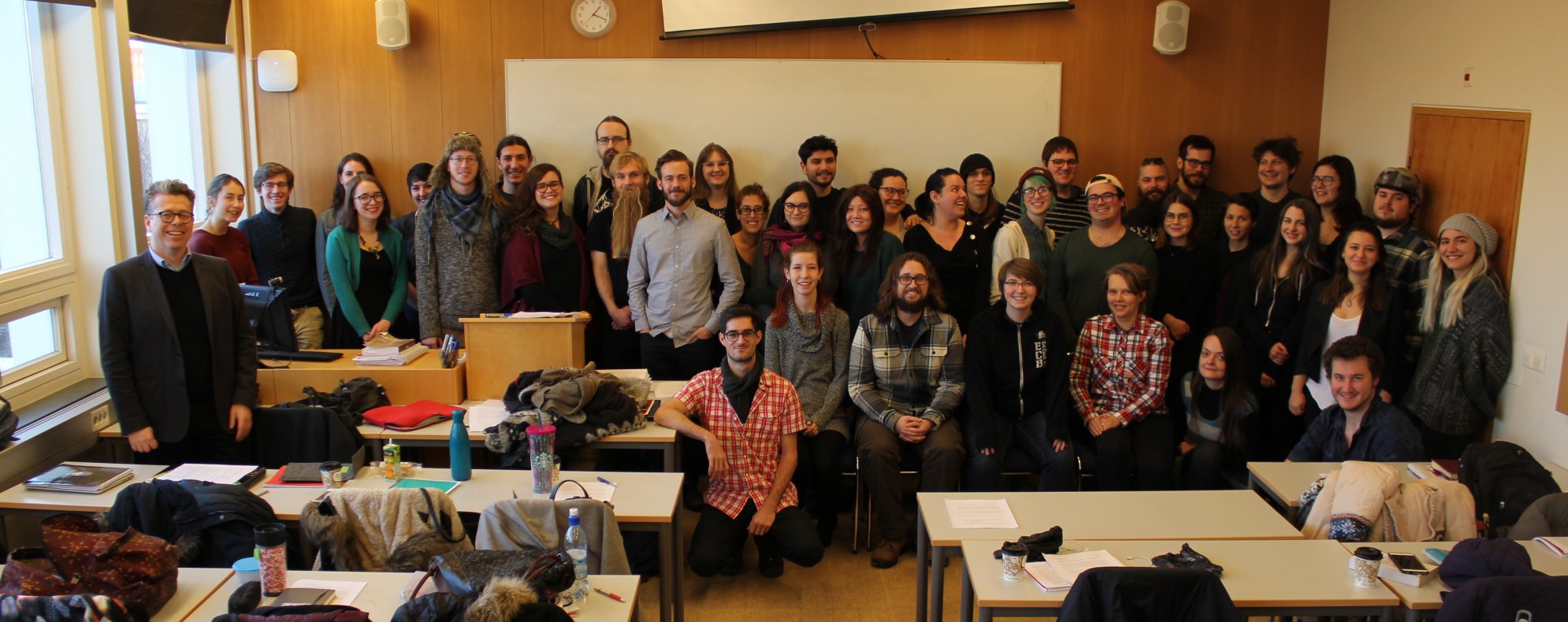Teaching Icelandic in virtual reality
When Branislav Bédi was a university student in his home town in Nitra in Slovakia in the early years of the 21st century, he first heard of the Poetic Edda, which sparked a passion for the Icelandic language. Now, around 15 years later, he has a doctorate in second language studies from the University of Iceland and has devoted himself to spreading the Icelandic language across the world, for example with the help of computer technology. Indeed, this was the main topic of his doctoral thesis.
Branislav recently became the first student to complete a PhD in second language studies from the University of Iceland Faculty of Languages and Cultures. He has lived in Iceland in recent years and first came to the country in 2006.
Doctoral defense in education science: Friðborg Jónsdóttir
Aðalbygging
Friðborg Jónsdóttir defends her PhD thesis in Educational Sciences from the Faculty of education and pedagogy, University of Iceland:
Transition from preschool to primary school for culturally and linguistically diverse children in Iceland. A praxeology study with teachers.
The oral defence takes place Wednesday JUne 19th., at 12:00 pm in the Aula in the main building of the University of Iceland as well as in live stream.
Opponents are Dr Ghazala Bhatti Associate Professor at Bath Spa University, UK and Dr Wendy Goff Associate Professor at Swinburne University of Technology, Melbourne, Australia.
Main supervisor was Dr Jóhanna Einarsdóttir Professor Emeritus at the School of Education, University of Iceland and co-supervisor Dr Sue Dockett Professor at Charles Sturt University, Australia.
One of the most remarkable medicinal plants in Iceland
"The Arctic root (Rhodiola rosea) is without a doubt one of the most valuable medicinal plants in the Icelandic flora," says Þóra Ellen Þórhallsdóttir, professor of botany at the University of Iceland who is currently leading a study on the Arctic root with a grant from the Technology Development Fund. Þóra Ellen has specialised in primary succession, reproductive ecology and valuing nature; all relevant in this project, and she also focuses on climate change in her research.
Adjunkt lecturer in Polish studies teaches Icelanders for the first time
Mariola Alicja Fiema has been hired as adjunct lecturer in Polish studies, a new subject at the Faculty for Languages and Cultures at the University of Iceland. She says that this programme, along with Icelandic studies for Polish people, will contribute to a strong, healthy, and tolerant community since Polish people are now the largest group of immigrants in Iceland, and Polish the second most spoken language.
Internationalization at Home
Háskólatorg
HT300
Faculty Member Engagement in the Context of Internationalization at Home at the University of Iceland: A Collective Case Study
Doctoral defense in education science: Bergljót Þrastardóttir
Aðalbygging
Bergljót Þrastardóttir defends her PhD thesis in Educational Sciences from the Faculty of education and diversity, University of Iceland:
Making Sense of Gender in Compulsory School Practices in Iceland
The oral defence takes place Wednesday, October 18, at 9:30 am in the Aula in the main building of the University of Iceland, as well as in live stream.
Opponents are Dr Carolyn Jackson and Dr Claudia Mitchell
Main supervisor was Dr Ingólfur Ásgeir Jóhannesson Professor at the School of Education, University of Iceland, and co-supervisor Dr Steinunn Helga Lárusdóttir Professor emeritus at the School of Education, University of Iceland.
Orientation Days for New Exchange Students
Háskólatorg
The Orientation Days programme includes practical information session, guide on how to make the best out of the stay in Iceland and the keys to success when studying at the University of Iceland. Furthermore, there will also be a crash course in Icelandic, a welcome reception with BBQ and live music, mentor-mingle and other social activities.
The aim of the Orientation Days is to welcome new international students and prepare them for a successful start at the University of Iceland. Students will have the chance to meet other students, learn about available support services, and to start adjusting to a new culture.
The Orientation Days programme is specifically targeted towards incoming exchange students, but all new international students are welcome to take part in the events in the Student Cellar. New international students studying a full degree at the University of Iceland will also be invited to welcome meetings in their respective schools.
Undergraduate Studies
Diploma in Health Information Management is a 90 ECTS credit distance study for two semesters and 30 ECTS (14 weeks) of practical training within a health institution.
The Faculty of Medicine offers undergraduate studies for a BS degree in Biomedical Sciences, Medicine, Physical Therapy Sciences, and Radiography. All of these programmes open up possibilities for giving but also demanding jobs in hospitals, healthcare institutions, and an increasing number of businesses that provide services in these fields. These BS programmes are full-time study programmes for three years, or 180 ECTS.
Doctoral defense in education science: Björk Ólafsdóttir
Aðalbygging
Aula in the main building of the University of Iceland
Björk Ólafsdóttir defends her PhD thesis in Educational Sciences from the Faculty of Education and Pedagogy, University of Iceland.
The oral defence takes place Tuesday, October 3, at 1:00 pm in the Aula in the main building of the University of Iceland as well as in live stream.
Dissertation title: The origin, use and perceived impact of the external evaluation of compulsory schools in Iceland.
Opponents: Dr Melanie Ehren at Vrije Universiteit Amsterdam and Elisabet Nihlfors Professor emerita at Uppsala University.
Main supervisor: Dr Jón Torfi Jónasson at the School of Education, University of Iceland
Co-supervisor: Dr Anna Kristín Sigurðardóttir Professor at the School of Education, University of Iceland.



